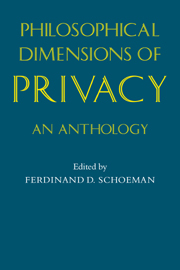Book contents
- Frontmatter
- Contents
- List of contributors
- Preface
- 1 Privacy: philosophical dimensions of the literature
- 2 Social distance and the veil
- 3 The origins of modern claims to privacy
- 4 The right to privacy [the implicit made explicit]
- 5 Privacy [a legal analysis]
- 6 Privacy as an aspect of human dignity: an answer to Dean Prosser
- 7 Privacy [a moral analysis]
- 8 Privacy, freedom, and respect for persons
- 9 Privacy and self-incrimination
- 10 Intimacy and privacy
- 11 The right to privacy
- 12 Why privacy is important
- 13 Privacy, intimacy, and personhood
- 14 Privacy: some arguments and assumptions
- 15 An economic theory of privacy
- 16 Privacy and the limits of law
- 17 Privacy and intimate information
- Selected bibliography
- Index of names
3 - The origins of modern claims to privacy
Published online by Cambridge University Press: 12 December 2009
- Frontmatter
- Contents
- List of contributors
- Preface
- 1 Privacy: philosophical dimensions of the literature
- 2 Social distance and the veil
- 3 The origins of modern claims to privacy
- 4 The right to privacy [the implicit made explicit]
- 5 Privacy [a legal analysis]
- 6 Privacy as an aspect of human dignity: an answer to Dean Prosser
- 7 Privacy [a moral analysis]
- 8 Privacy, freedom, and respect for persons
- 9 Privacy and self-incrimination
- 10 Intimacy and privacy
- 11 The right to privacy
- 12 Why privacy is important
- 13 Privacy, intimacy, and personhood
- 14 Privacy: some arguments and assumptions
- 15 An economic theory of privacy
- 16 Privacy and the limits of law
- 17 Privacy and intimate information
- Selected bibliography
- Index of names
Summary
Privacy in the animal world
Man likes to think that his desire for privacy is distinctively human, a function of his unique ethical, intellectual, and artistic needs. Yet studies of animal behavior and social organization suggest that man's need for privacy may well be rooted in his animal origins, and that men and animals share several basic mechanisms for claiming privacy among their own fellows. Within the past year these points have been in two excellent books for the general reader that report recent findings in biology, ecology, and anthropology—Edward Hall's The Hidden Dimension and Robert Ardrey's The Territorial Imperative. Thus we begin our analysis of man's patterns of privacy at the chronological starting point—man's evolutionary heritage.
One basic finding of animal studies is that virtually all animals seek periods of individual seclusion or small-group intimacy. This is usually described as the tendency toward territoriality, in which an organism lays private claim to an area of land, water, or air and defends it against intrusion by members of its own species. A meadow pipit chases fellow pipits away from a private space of six feet around him. Except during nesting time, there is only one robin on a bush or branch. The three-spined stickleback guards an invisible water wall around him and attacks any other stickleback that swims into his territory. Antelopes in African fields and dairy cattle in an American farmyard space themselves to establish individual territory.
- Type
- Chapter
- Information
- Philosophical Dimensions of PrivacyAn Anthology, pp. 56 - 74Publisher: Cambridge University PressPrint publication year: 1984
- 17
- Cited by



